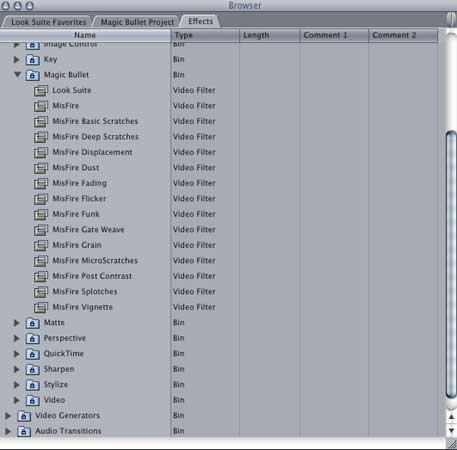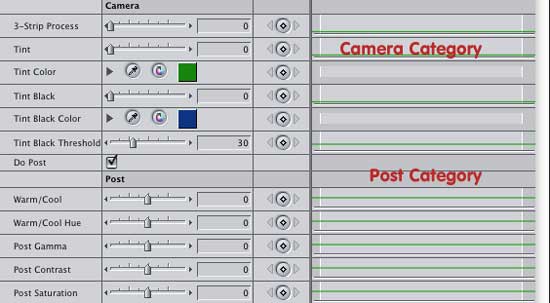Magic Bullet for Editors
for FCP HD 4.5 introduces many key elements of the Magic Bullet
Suite to the FCP timeline and at excellent price point. Cutters
can now apply film treatments to video directly within a FCP
sequence. This new plug-in is based on Magic Bullet Suite, a
previously After Effects only plug-in that provides an all-digital
pipeline for finishing digital movies and other video projects.
The product is sold through Red Giant Software at http://www.redgiantsoftware.com/.
What It Is and Is Not. Magic Bullet For Editors (MBE) consists of
two elements: the Look suite of filters designed to emulate film;
and Misfire, which adds film-like "damage" to your
video. Both provide stock presets, but Misfire implements them
more elegantly through the Effects tab.
MBE does not provide what many consider
the most important feature of Magic Bullet Suite, a true 24P
frame rate. Nor does it remove DV artifacts another feature
of Suite. To compensate, however, MBE is 70% less expensive than
Suite. Red Giant Software compares the products at its web site
(http://www.redgiantsoftware.com/magicbulletfamily.html).
If you can live without the 24P capabilities
of its AE-only version, MBE provides some pretty impressive stock
presets to emulate film or "roll your own" using the
Look Suite. But remember, these are film "look" treatments,
not a 24 fps progressive treatment. If you want true 24P, you'll
need a video camera with that capability, a software conversion
package such as Film Effects V1.5, (http://www.nattress.com),
or the more expensive Magic Bullet Suite.
Installation.
The product is available either as a web download from the Red
Giant Software site, or as a boxed version. You'll save $20.00
by electing the download version. The install package includes
the application installer, PDF instruction manual with tutorial,
and a FCP project file entitled "Look Suite Favorites."

This file is opened as a project tab
in your project bin and contains a series of stock presets that
can be applied to your project.

This implementation, I believe, is inelegant.
To use the stock presets, you must first open this project together
with your working project in order to use the presets. Interestingly,
the Misfire presets are included as separate stock presets within
the effects menu.

Using Magic Bullet Editor. Once you've opened both your project and the
preset "Look Favorites" project, using MBE is fairly
straightforward. You can work in any of three ways. First, apply
the Look Suite to your clip by applying the filter.


Then adjust each of the separate parameters
for Subject, Lens Filter, Camera, and Post. At first look, the
filter parameters appear daunting due to the availability of
26 separate adjustments. However, as you adjust each of four
parameters separately, you quickly adjust to the ease of use
for each. In addition, the Portable Document File (pdf) manual
provides excellent explanations on the use and technique for
each of the parameters.
For example, the Subject category can
adjust how the footage was shot, and compensate for incorrect
gamma, saturation, and contrast. If your footage is well shot,
you probably won't need a Subject category adjustment.
The Lens parameter provides controls
to emulate the "look" of various filters you could
have utilized when shooting the footage. Grade, size, and highlight
bias sliders provide separate controls for popular filters such
as Black and White Diffusion. You can also add a Grad filter
to the footage.
The third parameter category of the Look
Suite is used to adjust how much tint can be added or subtracted
from your footage by emulating how a film camera relates to light.
Most of your creative energies, however,
will be used when adjusting Post category parameters. Here you
can warm or cool the footage, and adjust the hue, gamma, saturation,
and contrast. Any of your tweaked parameters used to create a
specific look can be saved as a favorite.
In addition, fifty-five (55) custom-designed
presets are provided using the "Look Favorites" project
file. They are applied as any filter, and can be adjusted and
saved as a favorite. The presets come in seven categories, including
basic, diffusion, film looks, specialty, stock emulsion, and
tints. Most presets provide a distinct looks, variations within
a category are not dramatic for the most part. RedGiant's web
site provides an excellent detailing of various looks, and the
manual details what the preset is intended to emulate.
Get A Cup of Coffee Go Lunch. There is a tradeoff for all this creative machinery,
and it is manifested in rendering time, which is exceedingly
slow even on a tricked out 2 GHz dual processor G5. Be prepared
to wait slightly less than one minute to render a five
second long clip using a stock preset on NTSC DV footage. The
upside, however, is impressive quality output. While the footage
lacks 24P uniqueness, both the Suite and the presets provide
attractive emulation of film treatments that you can tweak endlessly.
Misfire. The 14 Misfire effects reside
in the filter folder for the Look Suite.

They are applied as any filter and provide
usually one or two sliders to adjust the various parameters specific
to that filter. Rendering time was all over the place, fast for
some Misfire filters, and very slow for others. I also noticed
more fan activity on my G5 when applying some these filters.
There is a nice assortment of various "looks" in Misfire.
Conclusions.
While MBE does not offer 24P conversion, it's the next best thing
to achieving popular and artistic film "looks" within
the FCP timeline by either utilizing supplied presets, or your
creative talents. As expected, rendering is slow, but worth the
wait. In my view, the included presets are awkwardly implemented,
but provide a wide spectrum of "looks" that any film
buff would admire. I have to emphasize, however, that MBE does
not provide progressive video output; so what you are buying
for $299.00 is essentially a series of prepared shortcuts designed
to emulate specific "film-like" looks without 24P output.
Some will be satisfied with these capabilities alone for the
price; other cutters will emphasize the importance of 24P and
opt for the alternatives available and the additional price they
entail. Only you can be the judge of which alternative you choose
and at what price point.
Misfire adds stock "damaged"
film looks that can augment the appearance you are seeking.
MBE provides much of the Suite's capabilities for a fraction
of its price, and doesn't require you to leave FCP.
©Copyright
2004 David Saraceno
All Rights Reserved
All screen captures and
textual references are the property and trademark of their creators/owners/publishers.
For another opinion on Magic
Bullet for Editors, click HERE
David
Saraceno is a motion graphics
artist located in Spokane, Washington. He has written for DV
Magazine, AV Video, MacHome Journal, and several state and national
legal technology magazines. David also moderates several forums
on 2-pop.com